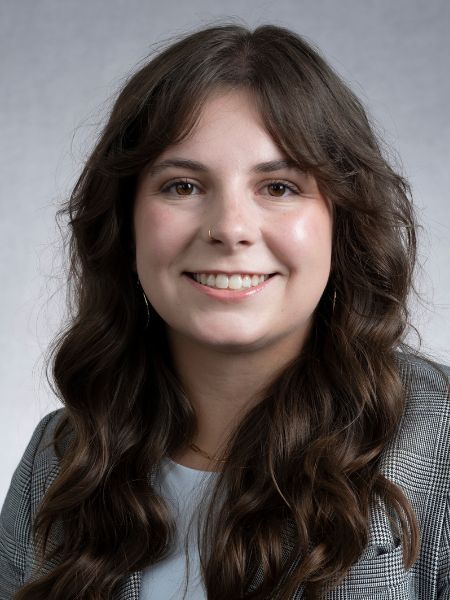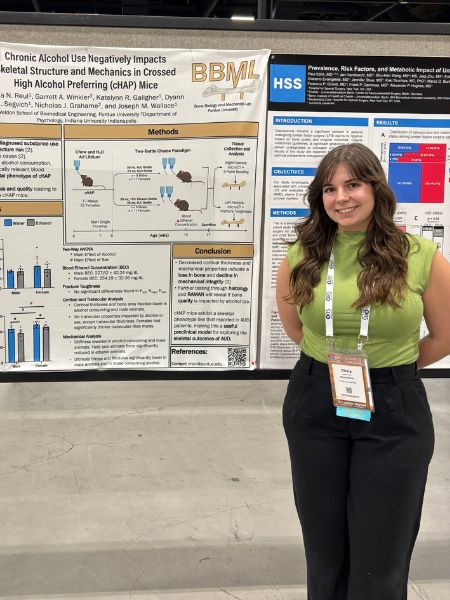Purdue Engineering graduate student profile: Olivia Nicole White

Type 2 diabetes and alcohol use disorder (AUD) have been well documented across the U.S.: more than 38 million Americans have diabetes — 90-95% of them Type 2, according to the Centers for Disease Control and Prevention — and a 2023 survey by the National Institute on Alcohol Abuse and Alcoholism found that some 29 million people had AUD. Both conditions bring with them a host of problems, among them skeletal weakness and fracture risk.
Olivia White, in tackling the two challenges together, is filling a vital gap, as there has been little research on treating patients who have both diseases. The PhD student in the Weldon School of Biomedical Engineering, a Leslie A. Geddes Fellow, is studying in professor Joseph Wallace's Bone Biology and Mechanics Lab in Indianapolis. White cites the ability to collaborate and conduct research across a host of students and instructors in Indianapolis, West Lafayette and the Indiana University School of Medicine as key to her team-based projects to tackle the challenge — as well as helping her understand the “big picture” behind her research.
What investigative avenues are you pursuing?
My research focus is assessing the skeletal outcomes of Type 2 diabetes and alcohol use disorder. Each of these conditions has been shown to negatively impact the skeleton of patients leading to increased fracture risk. However, there is little research assessing the skeletal outcomes in patients with both diseases. Consequently, I hope to bridge this gap through research with rodent models of combined Type 2 diabetes and alcohol use disorder. Through this work, I will assess how these conditions detrimentally impact the skeleton and explore whether existing treatment options can improve these skeletal deficits. I anticipate that this work will close existing gaps in skeletal research while leading to a better understanding of how we can improve the quality of life and lifespan of patients in these populations.
What spurred your interest in this particular topic and line of research?
I first became interested in bone research when I took Professor Wallace's introductory biomechanics course during my undergraduate degree (Wallace is a professor of biomedical engineering and associate vice president for research development at Purdue University in Indianapolis). It was during this class that I first began to learn how complex and dynamic bone is, which piqued my interest in this field of research. I became interested in my specific research area of Type 2 diabetes and alcohol use disorder after attending a bone research conference. It was at this conference that I heard physicians discussing the difficulty of treating patients with Type 2 diabetes that also chronically consumed alcohol. I then began trying to find literature over this topic and saw a gap that I was interested in pursuing.
Why did you Pick Purdue to continue your studies as a graduate student?
I chose Purdue for graduate school because of the experience I had as an undergraduate in a Purdue program, where I was able to participate in research independently and on multidisciplinary teams. Each of these experiences fostered my passion for research and instilled an appreciation for the opportunities offered through Purdue. I also chose Purdue because of the recent expansion in Indianapolis. Since entering my PhD program, I have had the ability to live and work in the capitol of Indiana near the Indiana University School of Medicine while maintaining access to Purdue resources, courses and collaborators in West Lafayette. This is a novel opportunity that I have truly appreciated throughout my PhD.
When did you first get interested in engineering and science?
I first became interested in science when I was in middle school. I had a science teacher at the time that dedicated the last 20 minutes of class to answering any questions students had, even if they were not related to what we were learning in class. Having the ability to ask any question and receive a scientifically founded explanation sparked my interest in science. I then became interested in pursuing a career in engineering after attending a Women in Engineering summer camp in Indianapolis through Purdue.
What’s it like studying at Purdue?
Studying at Purdue has been a unique experience, as I have had the ability to take courses in Indianapolis and West Lafayette. I have found that instructors and advisors across campuses are excited to engage with students and create a classroom that encourages innovation and curiosity. I have also had the opportunity to collaborate with peers across campuses, which has helped me learn more about each campus and city while creating a network across the state.
What else have you learned at Purdue, beyond subject matter?
As a Purdue graduate student, I have learned better collaboration techniques and time management. I have learned how to effectively collaborate with others from working with peers in research and from my courses that have implemented team-based projects. Learning to balance lab work, coursework, and being a teaching assistant, has also taught me how to manage my time in a way that allows me to achieve professional and personal goals.

What is the Purdue research environment like?
The ability to collaborate across campuses truly makes the Purdue research environment stand out. This facet of Purdue has given me the opportunity to collaborate with students and instructors in West Lafayette, Indianapolis and the Indiana University School of Medicine. Doing this has helped me understand the bigger picture behind much of my research while also making me more informed of areas outside my research interest.
As a Purdue graduate student, I had the opportunity to attend the Orthopaedic Research Society conference and present my research in a poster. In doing this, I got the opportunity to receive feedback from experts from across the country — and even those from Purdue who I had not yet met.
What advice might you give to other students deciding where to attend graduate school?
I recommend learning about the culture of the lab and campus you are considering joining prior to accepting an offer. While choosing a research topic you are passionate about is key, enjoying the environment you are in and maintaining work-life balance are each necessary when completing a graduate school program.
If considering Purdue, I suggest researching and visiting both West Lafayette and Indianapolis. Across each location there are instructors with diverse research areas that could suit a variety of graduate students' interests. Furthermore, the opportunity to live and work in either of these locations gives students the option to choose to live in a city or a university-oriented town depending on what graduate school experience they are seeking.
What about the future? What are your goals; what are you looking to accomplish in this field?
I chose to pursue graduate school because of my passion for research and teaching. Consequently, I hope to pursue a career in academic research where I can continue to work in each of these areas. Overall, I hope to become an established researcher in my field with the ability to mentor students interested in pursuing a career in research.
Might you share with us a little window into your personality — some distinctive trait, habit of mind, or hobby/pursuit outside work?
Outside of work, I enjoy gardening, cooking, reading and spending time with my friends and family. I think dedicating time and energy to these pieces of my life outside of work is key to my overall success as a graduate student.
